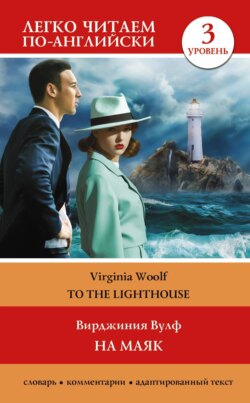Читать книгу На маяк. Уровень 3 / To the Lighthouse - Вирджиния Вулф - Страница 9
Virginia Woolf
To the Lighthouse
I. The Window
8
ОглавлениеHe said nothing. He took opium. The children said he had stained his beard yellow with it. Perhaps. What was obvious to her was that the poor man was unhappy. He came to them every year as an escape. Every year she felt the same thing; he did not trust her. She said,
“I am going to the town. Shall I get you stamps, paper, tobacco?”
And she felt him wince. He did not trust her. It was because of his wife. She remembered that iniquity of his wife’s towards him. He was unkempt; he dropped things on his coat. He had the tiresomeness of an old man. His wife said, in her odious way,
“Now, Mrs. Ramsay and I want to have a little talk together.”
Mrs. Ramsay could see the innumerable miseries of his life. Had he money enough to buy tobacco? Did he have to ask her for it? She made him suffer.
And always now he shrank from her. He never told her anything. But what more can she do? He has a sunny room. The children are good to him. It injured her that he shrinks. Everybody loved her. Everybody needed her. How could he not? When Mr. Carmichael just nodded to her question, with a book beneath his arm, she felt that all this desire of hers to give, to help, was vanity. For her own self-satisfaction was it that she wished so instinctively to help, to give, that people might say of her, “O Mrs. Ramsay! dear Mrs. Ramsay… Mrs. Ramsay, of course!” and need her and send for her and admire her? Was it not secretly this that she wanted, and therefore when Mr. Carmichael shrank away from her, as he did at this moment, making off to some corner where he did acrostics endlessly, she did not feel merely snubbed back in her instinct, but made aware of the pettiness of some part of her, and of human relations, how flawed they are, how despicable, how self-seeking, at their best.
Anyway, she should better devote her mind to the story of the Fisherman and his Wife and calm down her son James (none of her children was as sensitive as he was).
“The man’s heart grew heavy,” she read aloud, “and he did not want to go. He said to himself, ‘It is not right,’ and yet he went. And when he came to the sea the water was quite purple and dark blue, and grey and thick, and no longer so green and yellow, but it was still quiet. And he stood there and said…”
“The father of eight children has no choice.”
He muttered these words, turned, sighed, raised his eyes, saw the figure of his wife. She was reading stories to his little boy. He filled his pipe. He found consolation in trifles so slight compared with the august theme just now before him that he was disposed to slur that comfort over, to deprecate it, as if to be caught happy in a world of misery was for an honest man the most despicable of crimes. It was true; he was for the most part happy. He had his wife; he had his children. He had promised in six weeks’ time to talk “some nonsense” to the young men of Cardiff about Locke, Hume, Berkeley[8], and the causes of the French Revolution. But this and his pleasure in it he had to deprecate and conceal under the phrase “talking nonsense.” It was a disguise; it was the refuge of a man afraid to own his own feelings. He could not say, “This is what I like – this is what I am”. It was rather pitiable and distasteful to William Bankes and Lily Briscoe. Lily wondered why such concealments were necessary; why he needed praise. She wondered why so brave a man in thought was so timid in life. He was strangely venerable and laughable at the same time.
Teaching and preaching is beyond human power, Lily suspected.
Mrs. Ramsay gave him what he asked too easily. Then the change must be so upsetting, Lily said. He comes in from his books and finds us all playing games and talking nonsense. Imagine what a change from the things he thinks about, she said.
8
Locke, Hume, Berkeley – Локк, Юм, Беркли (английские философы, мыслители)
